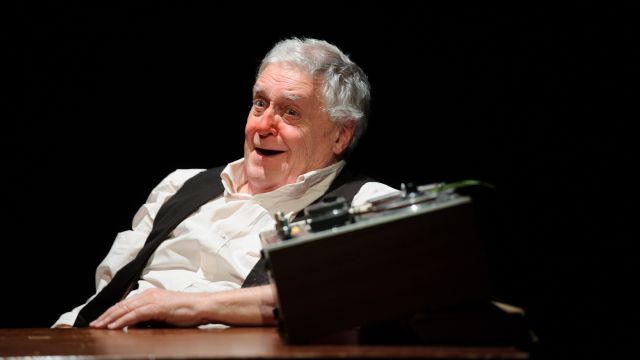Krapp’s Last Tape
Krapp (Max Gillies) sits alone behind a desk under a harsh downlight. Outside that circle of light, the adaptable but suddenly vast fortyfivedownstairs space recedes into gloom and then black. When Mr Gillies leaves the light, he disappears, and his presence is indicated by the sounds of whatever he is doing out there in the darkness. Does he not want us to know what he does out there? No. That is a choice Krapp has made – to keep things separate while he excoriates himself. Besides, as he says, he enjoys going into the darkness because then he can return to the light. But this is not a monologue directed to the audience. Krapp’s not interested in us; when he speaks, he speaks to himself. He is all he has.
The design concept is by the director, Laurence Strangio, whose use of space, either here, or in the tiny La Mama spaces, is always original. The inclusion of almost the whole fortyfivedownstairs space emphasises Krapp’s isolation… but it also involves Krapp’s long walks into the darkness (death?) and they somehow evoke laughter. Darius Kedros’ sound design emphasises what he is doing while he is literally invisible to us: a search through detritus for boxes of audio tapes, a garbage bin opened and closed. When Krapp wants a particular tape – the one he recorded on his thirty-ninth birthday – in a particular box, he fumbles around in the darkness and returns with six boxes on a trolley, then inspects each until he finds the right one.
How has this play survived for sixty years? After all, it is a sad and bitter old man – well, sixty-nine – alone on stage. Sixty-nine seemed old to Beckett in 1958 when he was 52 – so it is set in ‘A late evening in the future.’
Krapp listens to a tape made thirty years ago – and laughs at his pompous, over-confident 39-year-old self even as that self is mocking his 29-year-old self. He records a new tape; it’s something he does each year on his birthday and he’s made notes. He may be scathing and contemptuous about his 39-year-old self, but as he records his ‘last tape’, regrets overcome him. His failures. The loves he sacrificed to thwarted ambition. Not to mention his bowel problems and failing sexual powers.
‘Last’ could mean the last tape he will ever record, or it could mean merely the most recent. By the end, we might suspect the former. Surely, aside from various interpretation by great actors (Patrick Magee, John Hurt, Harold Pinter, et al.), this play survives because it is about regret and loss – the path not taken, the lover lost, bad because fruitless decisions and hopes unfulfilled – things few of us escape or fear that we will not.
Mr Gillies is, among his many accomplishments, a clown – or, if you like, a comedian. As well as superb straight roles, he has proved his comedic ability over and over in his satirical shows on stage and television. Here, when he introduces us to his character, he makes us laugh. Krapp is short-sighted and peers at bits of paper and a set of keys. He searches around in his desk as if he can’t remember where he’s put things. He eats a banana and, despite the ascetic setting, chucks the skin on the floor. He does a constipated walk back and forth. He eats half of another banana and jams the other half in his waistcoat pocket. And so on. All this Mr Gillies does with his customary skill, but – even allowing for Beckett’s predilection for vaudeville and slapstick – it’s drawn out and I can’t help wondering if this approach might be a something of a misjudgement. Of course, it’s a legitimate approach to this enigmatic text, but does it quite come off?
For me, the laughter diminishes the pathos of Krapp. It diminishes the force of his contempt, not just for his 39-year-old self, but for his present self. It diminishes his anger at all his mistakes and all his losses – anger that could energise the text and the character. Is he a silly old man, a fool, or a terribly sad old man who has ruined his life?
Sixteen years ago, Mr Strangio directed John Flaus (then really sixty-nine) as Krapp at the original Faraday Street La Mama. What a contrast in concept. In that very small space, which as I remember Mr Strangio made even more confined and as if in a basement, Krapp was not ‘funny’ at all. Mr Flaus could scarcely move from the desk, and the tapes were all to hand. Yes, he fumbled, he rambled, he made ‘knight’s move’ associations and had lapses of memory, but he was sharp, and his self-lacerations were angry. Tough as this was to watch, it made us care for Krapp – possibly even more than Beckett, who called him ‘Krapp’, wanted us to.
It’s nevertheless a pleasure to watch Mr Gillies at work. Whatever is done, is done deliberately and pointedly. At the end, as Krapp is isolated under his light, he still seems to despair. He is alone and seems to have no future. He has remembered too much, more than he intended, his memories are what he is, and they can’t be changed.
Michael Brindley
Photographer: Sarah Walker.
Subscribe to our E-Newsletter, buy our latest print edition or find a Performing Arts book at Book Nook.

